Table of Contents
Key Use Cases for AI Knowledge Base SoftwareImplementation StrategyBest Practices for AI Knowledge Base Success
ROI Calculation Framework
Value Metrics to Track
Frequently Asked Questions
Ready to transform your knowledge management with AI?
Buyer Overview
Knowledge management has evolved from static repositories to intelligent, AI-powered systems that understand intent, surface relevant information contextually, and continuously improve through machine learning. The challenge for modern businesses is about making knowledge instantly accessible, consistently accurate, and genuinely helpful across every customer and employee interaction.
Traditional knowledge bases require manual updates, struggle with search accuracy, and often become outdated as businesses scale. AI-powered knowledge base software addresses these challenges by automating content creation, understanding natural language queries, and dynamically surfacing the most relevant information based on context.
According to Ayudo's platform capabilities, their AI-powered customer support agent platform integrates knowledge base functionality with:
- Real-time sync from URLs, PDFs, Google Drive, Intercom, and other sources
- Automated knowledge base updates that train AI agents continuously
- Multi-AI agent support that accesses knowledge across different workflows
- KB Gap Analysis to proactively identify needed knowledge articles
Key Market Reality:
Organizations struggle with scattered knowledge across multiple systems, outdated documentation, and poor search functionality that frustrates both customers and support teams. Modern AI knowledge base platforms must seamlessly integrate with existing workflows, provide intelligent search capabilities, and enable both self-service and agent-assisted support.
Understanding Knowledge Base Types & Platforms
Internal Knowledge Bases
Designed for employee access to company policies, procedures, training materials, and operational documentation.
Core Capabilities:
- Role-based access control and permissions
- Integration with internal tools and workflows
- Version control and content approval workflows
- Employee search and collaboration features
Best For: Organizations needing centralized internal documentation and employee self-service
External Knowledge Bases
Customer-facing help centers and documentation portals for self-service support.
Core Capabilities:
- Public-facing article publishing
- SEO optimization and discoverability
- Multi-language support
- Customer feedback and ratings
Best For: Companies wanting to reduce support tickets through customer self-service
Hybrid Knowledge Platforms
Unified systems serving both internal teams and external customers with segmented access.
Core Capabilities:
- Dual-purpose content management
- Flexible permission structures
- Unified analytics across audiences
- Integration with support workflows
Best For: Organizations requiring comprehensive knowledge management for all stakeholders
AI-Enhanced Knowledge Systems
Next-generation platforms that use AI for content creation, intelligent search, and continuous improvement.
Core Capabilities:
- Conversational AI understanding: Interprets natural language queries in any phrasing (e.g., "how do I reset password" vs "can't login, forgot my password") and understands intent, context, and entity extraction to surface the right answer
- AI-powered content creation: Automatically generates knowledge articles from support conversations, suggests content improvements, identifies gaps, and creates SEO/GEO-optimized content that performs well in traditional search engines and LLMs like ChatGPT, Gemini, and Perplexity
- Smart content recommendations: Predicts which articles users need based on their journey, previous interactions, current context, and behavior patterns
- Continuous learning and optimization: Uses machine learning to understand which content is most effective, automatically improves search relevance rankings based on user satisfaction signals, and adapts to changing user needs over time
- Multi-channel AI optimization: Ensures content is discoverable and citable by AI search engines, chat interfaces, and traditional search while maintaining consistent quality across all channels
Best For: Forward-thinking companies wanting intelligent, self-improving knowledge systems that work seamlessly across human search, AI-powered assistants, and LLM-based discovery
Head-to-Head Comparison: Top AI Knowledge Base Platforms
Advanced
Basic
Basic
Basic
Basic
Basic
Basic
Multiple sources
Limited
Limited
Limited
API-based
Manual
Manual
Specialized agents
NLP-powered
Basic
Basic
Advanced
Basic
Basic
Basic
2700+ apps
Zendesk ecosystem
Limited
Extensive
80+ tools
API-based
Basic
Proactive AI
Built-in
Answer Bot
Basic
Customer-facing only
Basic
Basic
Basic
Custom scenarios
Extensive
Basic
Advanced
Basic
Basic
Basic
AI translations
Yes
Yes
Limited
Yes
Manual
Manual
Detailed AI Helpdesk Platform Analysis
Ayudo - AI-Powered Knowledge & Workflow Platform
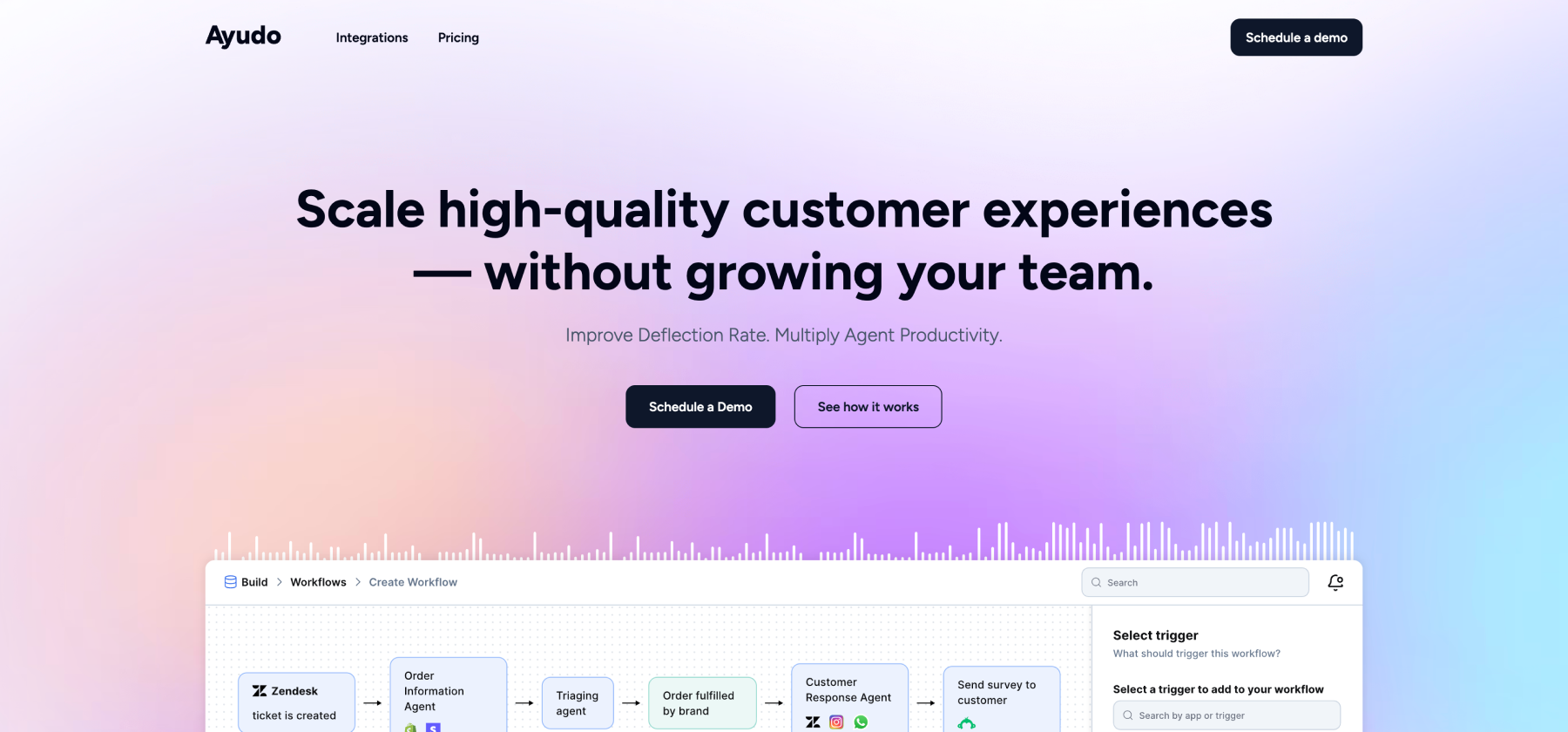
Best for: Organizations needing intelligent knowledge base integrated with agentic AI workflows
Strengths:
- Real-time knowledge sync from multiple sources (URLs, PDFs, Google Drive, Intercom, Zendesk, Salesforce, Freshdesk ,etc)
- Automated AI agent training with knowledge base updates
- Proactive Knowledge Base Gap Analysis identifies missing or outdated content
- Multi-AI agent support accessing knowledge across workflows
- Integration with 2700+ apps for comprehensive data layer
- Built-in agent copilot that surfaces knowledge proactively
- Custom quality checks and post-resolution insights
Unique Capabilities:
- Knowledge base powers both customer-facing and agent-assist AI
- Continuous auto-upgrade of AI agents with knowledge updates
- Schema definition for structured knowledge types
- Memory and context building for AI agents
- Multi language support or auto translations
- Voice-agent optimized knowledge base
Considerations:
- Newer platform with growing ecosystem
Zendesk Guide - Enterprise Knowledge Base

Best for: Large enterprises with existing Zendesk infrastructure
Strengths:
- Mature platform with extensive customization
- Content blocks that update automatically across articles
- Comprehensive analytics and reporting
- Integration with Zendesk ticketing ecosystem
- Community forum capabilities
Limitations:
- Complex setup requiring weeks of implementation
- AI features feel supplementary rather than core
- Locked into Zendesk ecosystem
- Higher total cost of ownership
- Generative AI limited to basic content expansion
Intercom Articles - Product-Led Knowledge Base
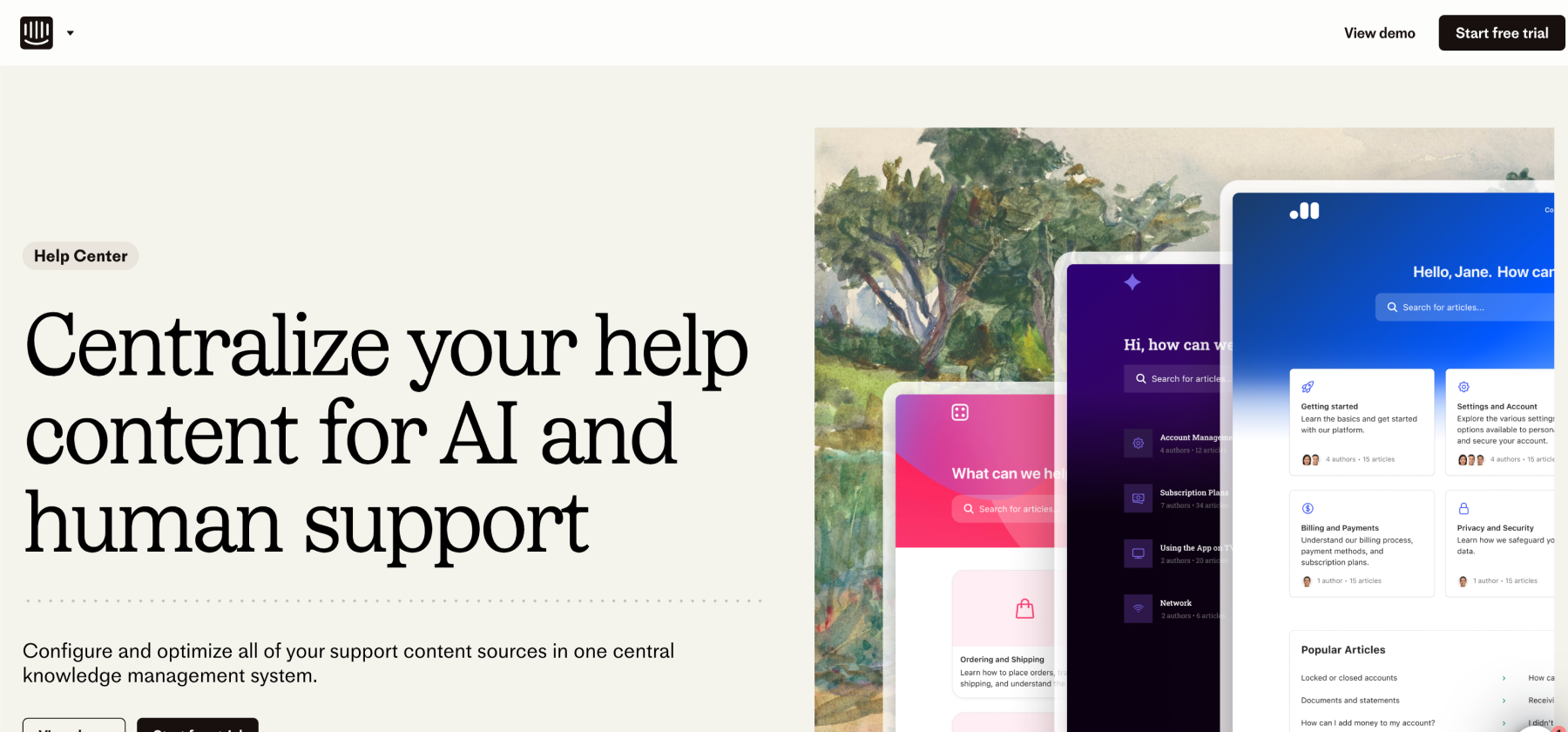
Best for: SaaS companies with product-led growth strategies
Strengths:
- In-app knowledge delivery
- Integration with Intercom messenger
- Good for product onboarding flows
- Clean, modern interface
Limitations:
- Limited AI capabilities for content management
- Expensive at scale
- Primarily focused on product companies
- Basic integration options outside Intercom ecosystem
- No advanced workflow automation
Guru - AI-Driven Internal Knowledge Management

Best for: Companies prioritizing employee knowledge access across tools
Strengths:
- Integrations across common business apps
- Knowledge surfaced where teams work
- Browser extension for easy access
- AI-powered knowledge suggestions
- Verification workflows to maintain accuracy
Limitations:
- Primarily internal-facing (not customer knowledge base)
- Limited workflow automation
- No agent copilot integration
- Custom pricing can be expensive
-
Document360 - Technical Documentation Platform
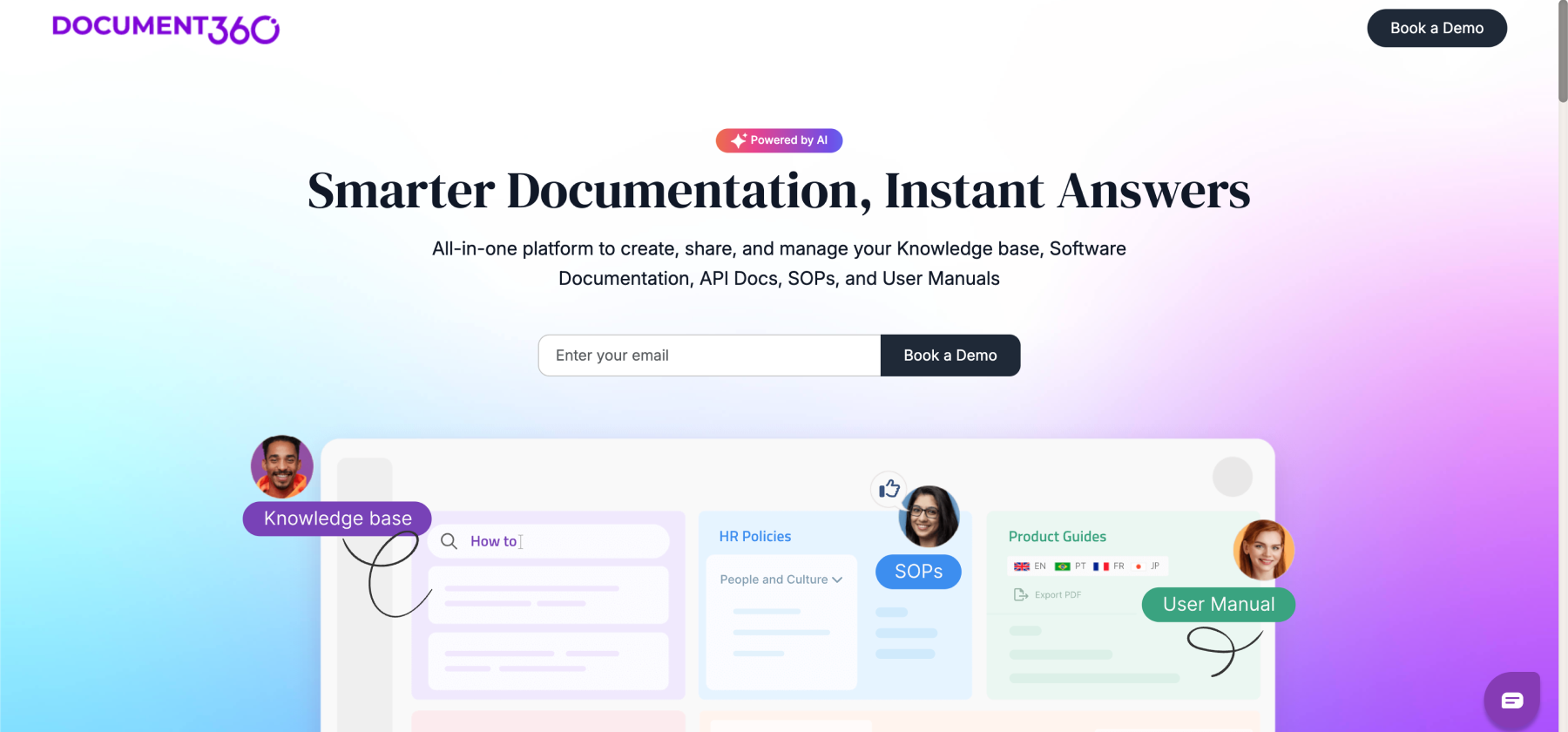
Best for: Companies with extensive technical documentation needs
Strengths:
- Robust version control
- Multi-language support
- Analytics and content performance tracking
- Good for large-scale documentation projects
- Category management and organization
Limitations:
- Primarily static documentation approach
- Limited AI capabilities (basic Eddy AI assistant)
- Manual content creation and updates
- No workflow automation
- Separate from support ticket systems
-
Capacity - AI Knowledge Management

Best for: Organizations needing structured knowledge with role-based access
Strengths:
- Drag-and-drop knowledge organization
- Department and role-based access controls
- Knowledge sharing workflows
- Decent AI-powered search
Limitations:
- Limited integration ecosystem
- Basic AI capabilities
- No agent copilot features
- Primarily internal knowledge focus
Talkdesk - Contact Center Knowledge
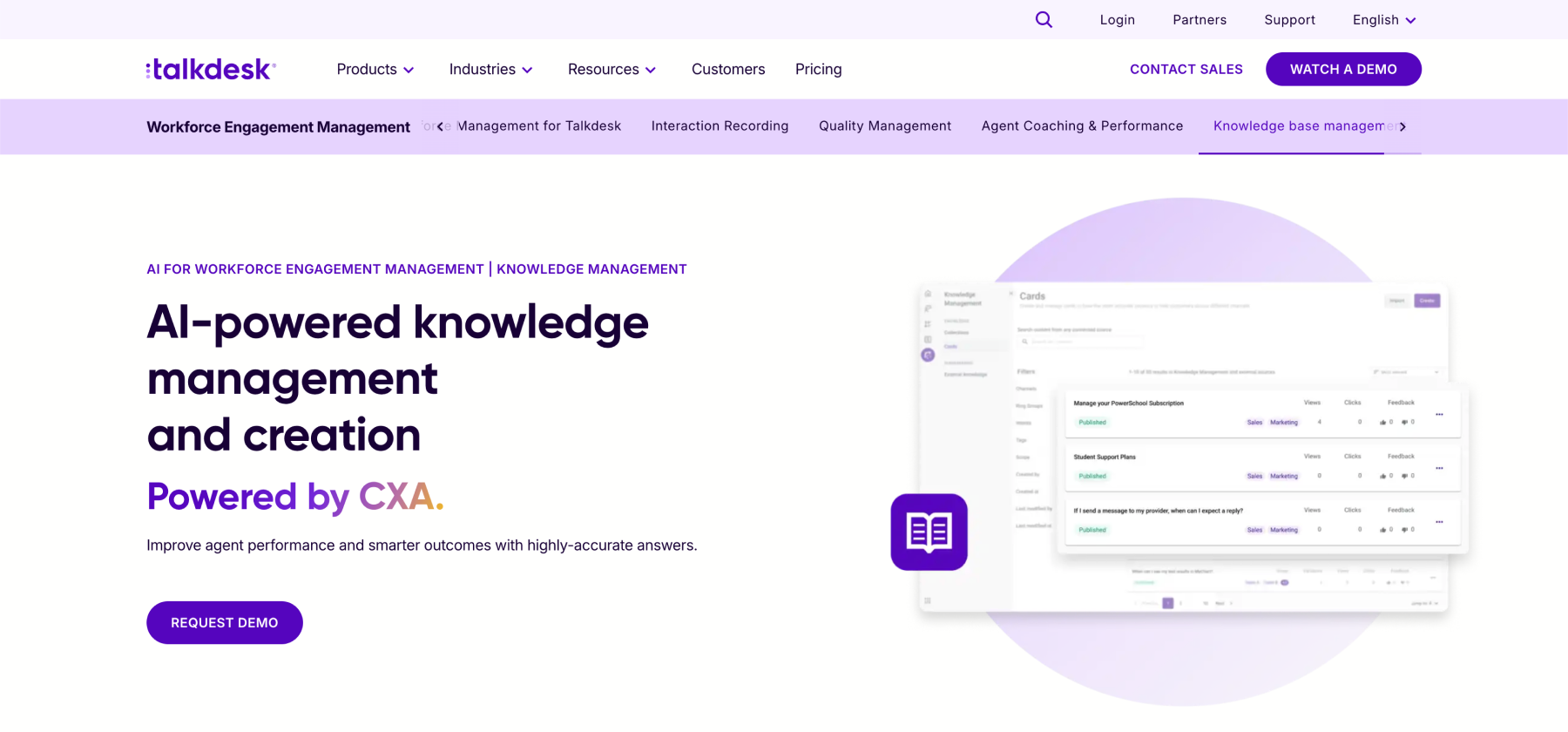
Best for: Large contact centers with voice-focused support
Strengths:
- Integration with Talkdesk contact center platform
- Agent-facing knowledge during calls
- Voice-optimized knowledge delivery
Limitations:
- Locked into Talkdesk ecosystem
- Limited external/customer-facing capabilities
- Expensive enterprise pricing
- Complex implementation
-
Kustomer - CRM-Integrated Knowledge
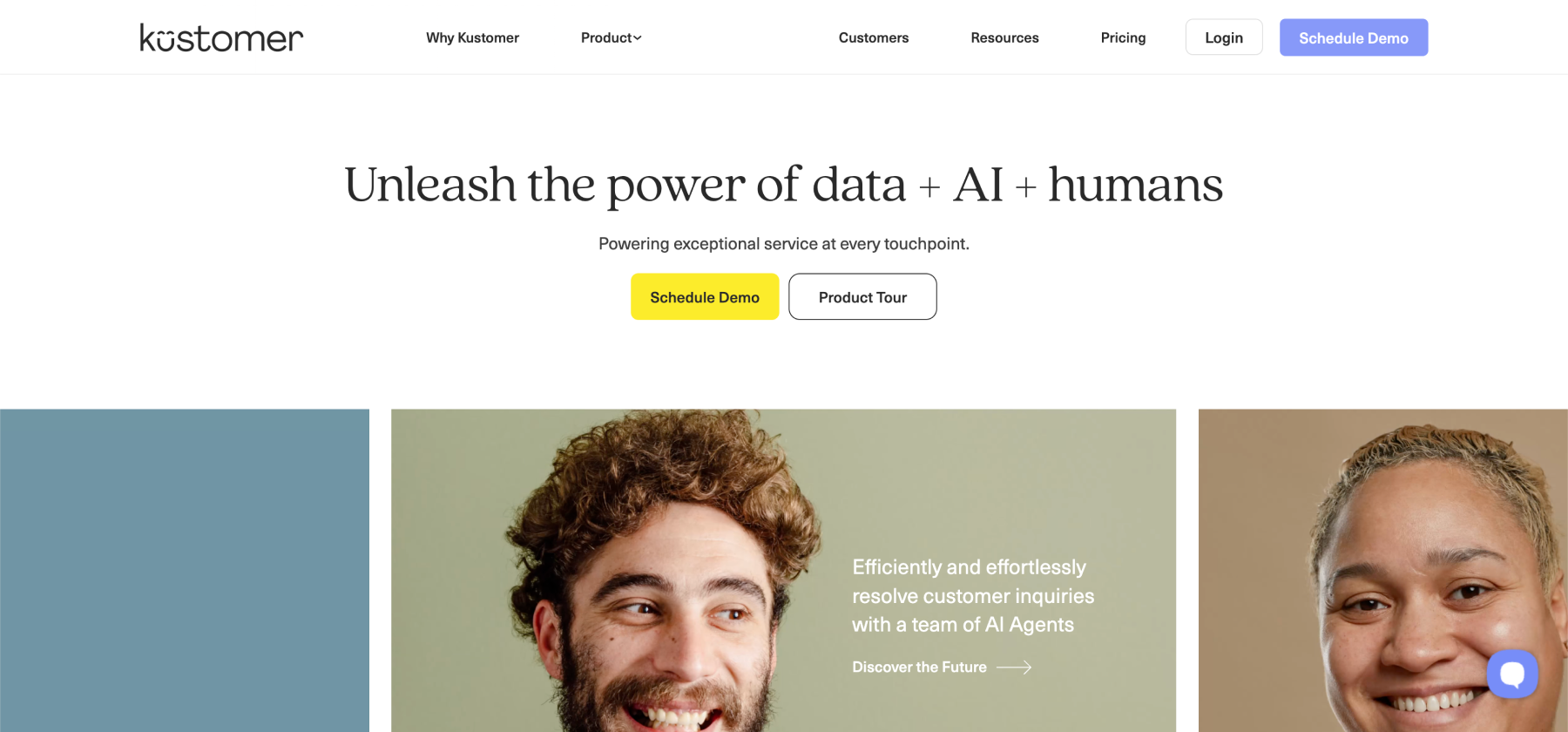
Best for: Companies wanting knowledge within CRM workflows
Strengths:
- CRM and knowledge in one platform
- Customer context integration
- Unified agent workspace
Limitations:
- Basic knowledge base features
- Limited AI capabilities
- Expensive for knowledge-only needs
- Requires full Kustomer platform adoption
HelpScout Docs - Simple Customer Knowledge Base

Best for: Small to mid-sized teams wanting straightforward knowledge management
Strengths:
- Easy to use and implement
- Clean customer-facing design
- Good search functionality
- Affordable pricing
- Integration with HelpScout support platform
Limitations:
- No AI content generation
- Limited automation capabilities
- Manual knowledge updates required
- Basic analytics and reporting
- No advanced workflow features
Notion - Flexible Team Workspace
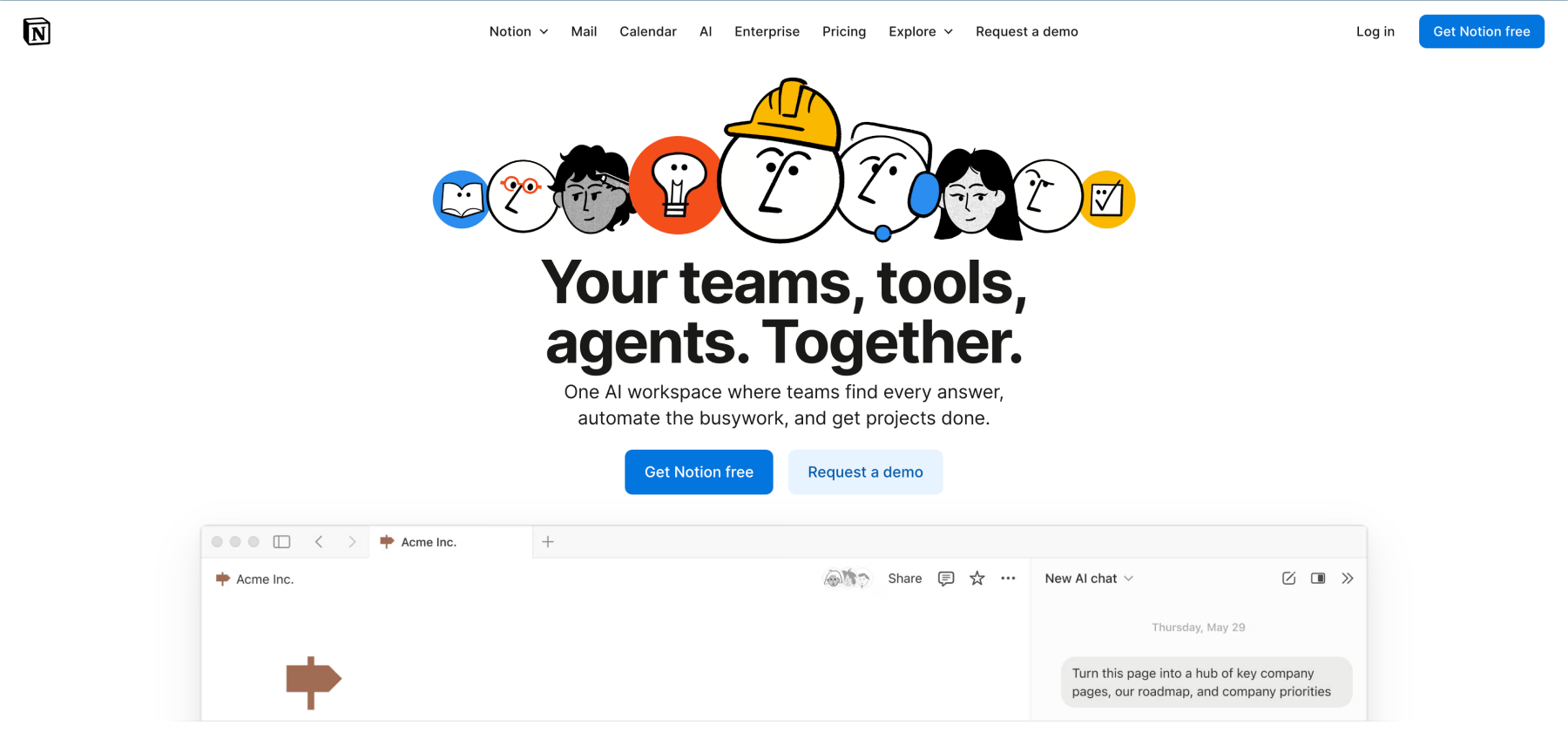
Best for: Internal team documentation and collaboration
Strengths:
- Highly customizable interface
- Multiple content formats (databases, boards, calendars)
- Good for team collaboration
- Affordable pricing
- AI writing assistance
Limitations:
- Not designed specifically for knowledge bases
- Limited customer-facing capabilities
- Basic search functionality
- No support workflow integration
- Manual knowledge management
Key Use Cases for AI Knowledge Base Software
Customer Self-Service Support
Goal: Reduce support tickets by enabling customers to find answers independently
Best Platform: Ayudo
- Real-time knowledge sync keeps content updated and relevant
- AI-powered search understands customer intent
- Integration with multiple channels (web, chat, email)
- AI-driven content recommendations to enrich support coverage
- Automated KB Gap Analysis highlights missing or underperforming content
Implementation Approach:
- Start with top 20 most frequent customer inquiries
- Create comprehensive articles with clear structure.
- With access to historical conversation, AI can help create these articles. User can choose the conversations and then ask to create the AI articles.
- Monitor search queries to identify gaps
- Use AI to generate variations and updates
- Track self-service success rates
Success Metrics:
- Increased self-service resolution rate
- Reduced ticket volume for common issues
- Improved customer satisfaction scores
- Lower support costs per resolution
Agent Productivity Enhancement
Goal: Empower support agents with instant access to accurate information
Best Platform: Ayudo
- Proactive copilot suggests relevant knowledge during conversations
- Real-time knowledge updates ensure accuracy
- Integration with conversation inbox
- Voice-to-text assistance for phone support. This is TTS+ LLM + STT layer for phone support.
- Context-aware knowledge surfacing
Key Features Needed:
- Agent-facing knowledge search
- Quick snippet insertion
- Suggested responses based on conversation
- Knowledge verification workflows
- Performance analytics
Impact:
- Faster resolution times (Ayudo reports 42% improvement)
- Reduced agent training time
- Consistent response quality
- Lower agent burnout
Internal Employee Knowledge Management
Goal: Centralize company information for employee self-service
Best Platform: Ayudo or Guru
- Role-based access control
- Department-specific knowledge organization
- Integration with internal tools and workflows such as Slack, MS teams, etc
- Search across multiple knowledge sources
- Automated updates from various systems
Content Types:
- HR policies and procedures
- IT troubleshooting guides
- Sales playbooks and resources
- Product documentation
- Training materials
Business Value:
- Reduced repetitive questions
- Faster employee onboarding
- Improved operational efficiency
- Preserved institutional knowledge
Multi-Channel Knowledge Delivery
Goal: Provide consistent knowledge across all customer touchpoints
Best Platform: Ayudo
- Unified knowledge source powering all channels
- Consistent responses across email, chat, voice, social channels
- Context preservation across channels
- Channel-specific formatting and delivery
- Unified analytics and reporting
Channel Coverage:
- Web help center
- In-app knowledge widgets
- Chatbot and messaging platforms
- Email support responses
- Voice support scripts
- Social media responses
Success Factors:
- Content is channel-agnostic but delivery is optimized
- Analytics track effectiveness by channel
- Updates propagate instantly across all channels
Implementation Strategy
Pre-Implementation Planning
Content Audit and Organization
- Analyze existing knowledge across all systems
- Identify gaps in current documentation
- Categorize content by audience and use case
- Define content governance and ownership
- Establish quality standards and style guides
Technical Requirements Assessment
- Identify integration needs with existing systems
- Evaluate data migration requirements
- Define access control and permission structures
- Plan for search functionality and optimization
- Determine analytics and reporting needs
Stakeholder Alignment
- Get buy-in from support, product, and content teams
- Define roles and responsibilities for knowledge management
- Establish content creation and review workflows
- Plan training programs for all users
- Set realistic timelines and milestones
Deployment Phases
Phase 1: Foundation Setup (Week 1-2)
- Configure knowledge base structure and categories
- Set up integrations with key systems
- Migrate or create core content for top use cases
- Establish search functionality
- Configure access controls and permissions
Phase 2: Content Population (Week 3-4)
- Create or migrate priority articles
- Implement AI training with existing content
- Set up automated content sync where possible
- Configure search optimization and relevance
- Enable feedback collection mechanisms
Phase 3: Agent Enablement (Week 5-6)
- Train support teams on knowledge base usage
- Integrate knowledge into agent workflows
- Set up copilot and suggestion features
- Establish content contribution processes
- Monitor agent adoption and effectiveness
Phase 4: Customer Rollout (Week 7-8)
- Launch customer-facing knowledge base
- Implement chatbot and self-service features
- Enable multi-channel knowledge delivery
- Monitor customer usage and satisfaction
- Optimize based on search analytics
Ongoing Optimization
Content Maintenance
- Regular content audits (weekly or monthly or quarterly)
- Update articles based on product changes
- Address knowledge gaps identified by analytics
- Archive or improve low-performing content
- Expand coverage based on new inquiries
Performance Monitoring
- Track search success rates and patterns
- Monitor self-service resolution rates
- Analyze agent knowledge usage
- Review customer feedback and ratings
- Measure impact on support metrics
Continuous Improvement
- Use AI to identify content gaps automatically
- Generate new content based on support conversations
- A/B test article formats and structures
- Expand to additional use cases and channels
- Refine search algorithms based on user behavior
Best Practices for AI Knowledge Base Success
Content Creation and Management
Write for Your Audience
- Use clear, simple language appropriate for your users
- Structure content with scannable headings and lists
- Include visual aids (screenshots, videos, diagrams)
- Provide step-by-step instructions for complex tasks
- Keep articles focused on single topics
Maintain Content Quality
- Establish review and approval workflows
- Use version control to track changes
- Set regular review cycles for all content
- Archive or update outdated information
- Implement quality metrics and standards
Optimize for Search and Discovery
- Use descriptive, keyword-rich titles
- Include common question variations in content
- Add metadata and tags for categorization
- Create clear navigation and category structures
- Implement related articles and suggestions
Optimize for AI and Generative Engines (GEO)
- Structure content with clear, factual answers at the beginning (answer-first format)
- Use semantic markup and schema to help LLMs understand content context
- Include authoritative sources and citations to increase credibility
- Write in clear, concise language that LLMs can easily parse and quote
- Add FAQ sections with direct question-answer pairs for LLM extraction
- Ensure content is crawlable and accessible to AI agents and search engines
- Include comprehensive context so LLMs can accurately represent your information
- Use structured data formats (JSON-LD, schema.org) for key information
- Create quotable, self-contained explanations that work well when extracted
AI and Automation Strategies
Train AI Effectively
- Provide comprehensive, well-structured content
- Use consistent terminology and formatting
- Include variations of common questions
- Update AI training with new content regularly
- Monitor AI accuracy and adjust as needed
Leverage Automation Wisely
- Use AI for content generation but maintain human review
- Automate repetitive updates and synchronization
- Implement smart content recommendations
- Set up automated quality checks
- Enable proactive gap identification
Balance AI and Human Touch
- Use AI for efficiency, humans for quality and nuance
- Provide clear escalation paths when AI can't help
- Maintain human oversight of AI-generated content
- Collect feedback to improve AI performance
- Ensure transparency about AI vs. human responses
Integration and Workflow Optimization
Embed Knowledge in Workflows
- Surface knowledge where users naturally work
- Integrate with support ticketing systems
- Enable knowledge access in all customer channels
- Connect with CRM for customer context
- Provide mobile access for on-the-go support
Enable Collaboration
- Allow easy content contribution from all teams
- Implement collaborative editing and review
- Create feedback loops from support to content teams
- Share analytics with relevant stakeholders
- Foster knowledge-sharing culture
Measurement and Analytics
Track Key Metrics
- Search success rate and common queries
- Self-service resolution rate
- Article views, ratings, and feedback
- Agent knowledge usage and efficiency
- Support ticket reduction by topic
Use Data for Decisions
- Identify high-priority content gaps
- Optimize poorly performing articles
- Expand coverage for trending topics
- Allocate resources based on impact
- Demonstrate ROI to stakeholders
ROI Calculation Framework
Cost Savings Analysis
Annual Ticket Reduction = (Current Tickets × Self-Service Rate × Avg Ticket Cost)
Agent Efficiency Gains = (Tickets Handled × Time Saved × Agent Hourly Rate)
Total Annual Savings = Ticket Reduction + Efficiency Gains - Platform Costs
ROI = (Total Savings / Implementation Costs) × 100
Example Calculation:
- Current monthly tickets: 10,000
- Self-service deflection rate: 30% (3,000 tickets)
- Average ticket cost: $10
- Monthly savings from deflection: $30,000
- Agent efficiency improvement: 20% (2,000 more tickets handled)
- Additional monthly value: $20,000
- Total monthly value: $50,000
- Platform + implementation costs: $75,000
- Projected ROI: 700% annually
Value Metrics to Track
- Support Cost Reduction: Lower cost per resolution through self-service
- Agent Productivity: More tickets resolved in less time (Ayudo reports 42% improvement)
- Customer Satisfaction: Faster answers and better experiences
- Scalability: Handle growth without proportional support team expansion
Frequently Asked Questions
Implementation & Setup
Implementation timelines vary significantly. Modern platforms like Ayudo can have knowledge bases syncing in under 60 minutes, while traditional solutions may take weeks for full deployment. The key factors are content readiness, integration complexity, and platform capabilities.
Leading AI knowledge base platforms offer no-code interfaces for content management. However, initial setup, integrations, and advanced customization may benefit from technical support. Look for platforms with intuitive content editors and strong implementation assistance.
Yes, most modern platforms support content migration through APIs, bulk imports, or automated sync. The ease of migration depends on your current system and the target platform's import capabilities. Ayudo offers real-time sync from multiple sources including URLs, PDFs, and other knowledge bases.
AI Capabilities and Performance
AI-powered search using natural language processing is significantly more accurate than keyword matching. Quality depends on training data, content structure, and continuous optimization. Well-implemented systems can understand intent even with conversational or imprecise queries.
Yes, modern AI can assist with content creation, including generating articles from support conversations, summarizing documentation, and suggesting updates. However, human review remains important for accuracy, brand voice, and quality control. Ayudo's platform automatically identifies knowledge gaps and suggests content creation.
AI knowledge bases improve through machine learning from user interactions, search patterns, and feedback. They learn which content is most helpful, identify gaps, and optimize relevance rankings. Continuous training with new content and usage data enhances accuracy and performance.
Customer Experience
For routine inquiries and quick answers, customers often prefer self-service through AI knowledge bases due to instant availability and faster resolution. However, complex issues still benefit from human support. The best approach combines both with seamless transitions.
AI knowledge bases can personalize based on user behavior, product usage, customer segment, and conversation context. Integration with CRM and customer data enables highly relevant content recommendations and search results tailored to individual needs.
Maintenance and Optimization
Content should be reviewed on a regular schedule (monthly or quarterly) and updated immediately when products, policies, or procedures change. AI-powered platforms can identify outdated content and suggest updates automatically. Ayudo's KB Gap Analysis proactively identifies articles needing updates.
Key metrics include search success rate, self-service resolution rate, article ratings and feedback, support ticket reduction, and agent productivity improvements. Analytics should track both customer and agent usage to demonstrate comprehensive value.
AI-powered platforms are designed to scale with your content volume. Features like automated categorization, intelligent search, and AI-driven content recommendations help users find information even in large knowledge bases. The key is maintaining good structure, regular audits, and leveraging AI for organization and discovery.
Ready to transform your knowledge management with AI?
Modern platforms make it possible to create intelligent, self-improving knowledge systems that serve both customers and support teams. The key is choosing a solution that integrates seamlessly with your workflows, provides genuine AI capabilities, and scales with your business.
*This guide was last updated in 2026. For the most current information on AI knowledge base platforms and implementation strategies, consult with solution providers directly.





